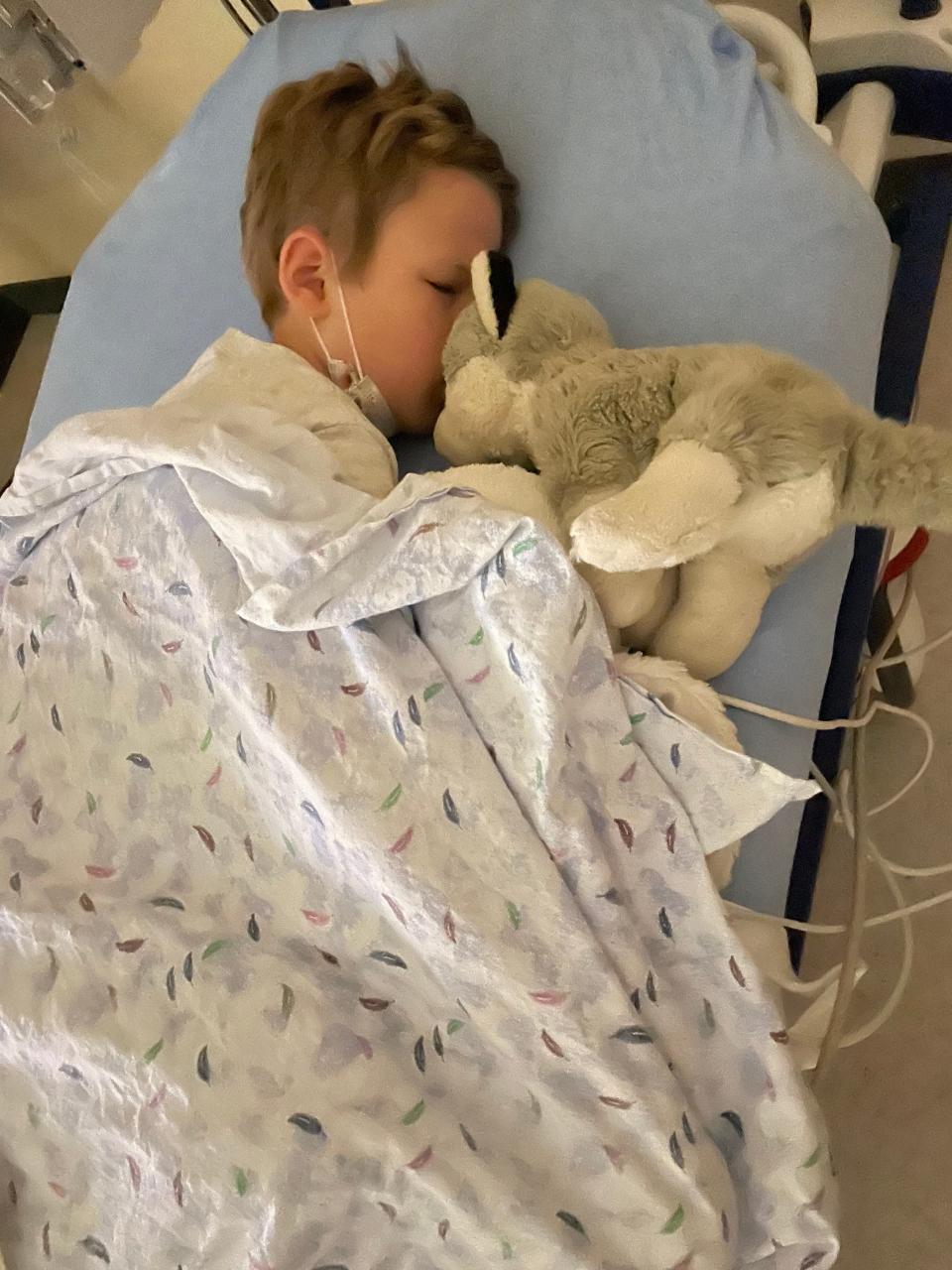What we wish we knew before our sons got caught in the 'tripledemic' hitting hospital care
Our son Sebastian’s sickness seemed rather routine: fatigue, an elevated temperature and a headache. We kept him home from school and watched him overnight, but the next morning things quickly spun out of control. Our 8-year-old boy was extremely lethargic and disoriented. After a call to our pediatrician’s emergency hotline, Monica rushed him to the emergency room near our Northern Virginia home.
Over the next 72 hours, our family would be thrust into the epicenter of the “tripledemic” – the confluence of COVID-19, flu and respiratory syncytial virus (RSV) that is swamping hospitals, straining their staffs and affecting the quality of care and the availability of pediatric beds. Thanksgiving gatherings will surely strain the nation’s hospital systems even further.
As parents of three young boys (8, 6 and 4), we have had our share of trips to the emergency room, urgent care and the unexpected jaunts to the pediatrician. We have the sense of competence that arrives about a year into parenthood, yet we were wholly unprepared for what we experienced. We felt helpless and ill-equipped.
A search for a children's hospital bed
Sebastian had a dangerous infection and was diagnosed fairly quickly with acute sinusitis and left-lung pneumonia. He was placed on heavy antibiotics and steady IV fluids, and we were told to bide our time as we waited for a bed at an area children’s hospital.

First up was Winchester Medical Center, 50 miles west of us. However, after reviewing his chart, that hospital said it wouldn’t take him as a patient because, if our son worsened, they weren’t equipped to handle him. (He would later need a spinal tap and other treatments that not all hospitals can accommodate.) Requests for transfers to Inova Fairfax in Virginia, Children’s National in Washington, D.C., and Johns Hopkins in Baltimore were all denied, we were told, because of a lack of available beds.
COVID-19 is still deadly real. Why do we allow disinformation to persist?
Finally, 30 hours after arriving at the emergency room, Sebastian was transferred to a hospital in Loudoun County, Virginia, about 30 miles from our home. He would stay another night, receive a battery of tests and, mercifully, be on his way home the next day. Little did we know that, hours later, Luke, our 6-year-old, would develop a 103-degree temperature and a racing heartbeat and require a trip to the ER that same night; he had Influenza A.
Both boys have since fully recovered and are back in school. But as we've been processing their journey, we've realized how much we didn’t know and discussed what we could have done differently had we been prepared.
Prepare for a child emergency
Based on our experience of navigating a child's medical emergency amid a strained system, here are our tips for parents or caregivers trying to navigate what promises to be a nasty cold/flu/COVID/RSV season:
1. Scout the hospitals. Which ERs have pediatric expertise and an adjoining pediatric hospital? ERs have to do it all, and the quality of care for children can vary dramatically depending on the facility. What are the bed capacities at the children’s hospitals near you? What are the wait times, which can change week to week and day to day? Know what you’ll be up against.
2. Have your pediatrician guide the care. Our pediatrician’s office is always busy, and she’s not available on some days (like the day Sebastian was admitted). It’s always best to have a pediatrician consulting with the ER doctors to drive the child’s medical care. Connect with your pediatrician and have a plan of action for if your child needs this type of urgent care. If they might not be available, draw up a Plan B. Is there another practitioner ready to step in? We were fortunate to have family members with medical expertise to consult along the way.
Opinion alerts: Get columns from your favorite columnists + expert analysis on top issues, delivered straight to your device through the USA TODAY app. Don't have the app? Download it for free from your app store.
3. Be vigilant with cough and congestion. Because of the tripledemic, a cold, cough or sinus infection can quickly devolve into something worse. In our case, our boys got COVID in October, recovered and returned to school, only to bring home in two subsequent waves garden-variety colds from which they never fully recovered. It can feel futile and demoralizing to manage the residual symptoms when new “bugs” demand attention, but be the parent who is overly cautious and even a little paranoid. These aren’t normal times.
My infant grandson was hospitalized for RSV: It's not something to take lightly
4. Have a go-bag ready. You might remember the go-bag from when you were awaiting your child’s birth. Having a bag ready for a possible ER visit is a good idea, especially in preparing for an accompanying adult’s needs. Pack the things you’d never think of on the way out the door: books, snacks, a toothbrush, change of clothes. It will take a little of the stress away so you can focus on your child and prepare for what might be a long wait in the ER.
5. What about the other kids? Many hospitals still have protocols in place that don’t allow healthy children in the ER. If you have other children, coordinate care ahead of time in case of an emergency. Consider setting up child care with a trusted friend or neighbor, where you agree to serve as the other’s backup.
We know that our family has many advantages – good health insurance, the support of our friends and colleagues, time off from work to manage our children’s care – that others in our country don’t have. Even so, this was unnerving, and downright frightening, under these best of circumstances. We hope few parents and caregivers ever need our advice, but it’s advice we wish we had had before Sebastian got sick.

Monica Hortobagyi Siniff is a freelance writer and aspiring children’s author. John Siniff is a communications executive in Washington, D.C. Both previously worked in USA TODAY’s newsroom.
You can read diverse opinions from our Board of Contributors and other writers on the Opinion front page, on Twitter @usatodayopinion and in our daily Opinion newsletter. To respond to a column, submit a comment to letters@usatoday.com.
This article originally appeared on USA TODAY: COVID, flu, RSV tripledemic: What to know before your kids get sick

 Yahoo Movies
Yahoo Movies 